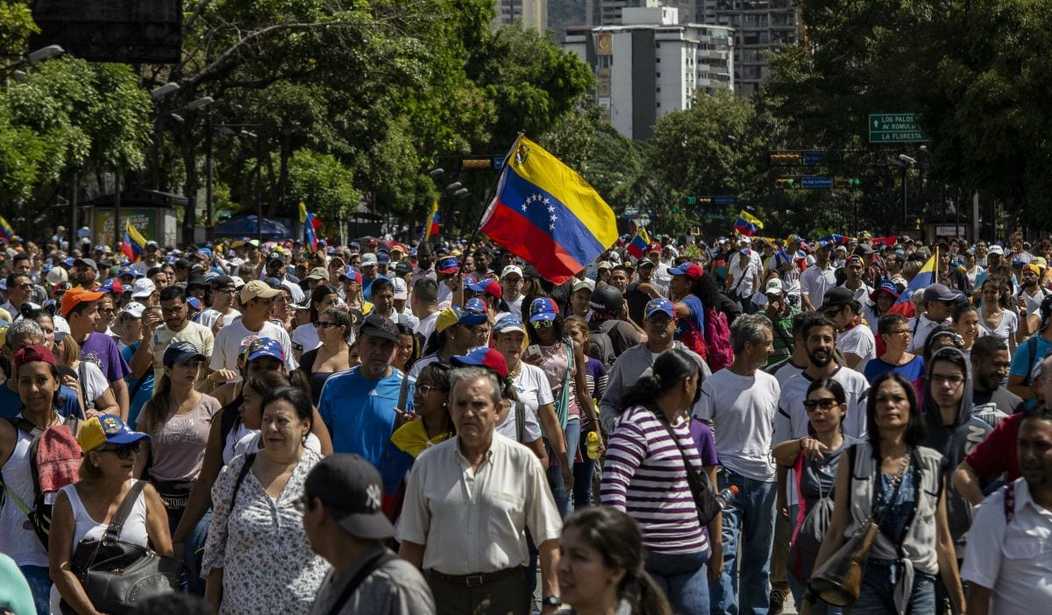Venezuela is following the ugly pattern of Latin American civil conflicts during the 20th century. Its strongman, Nicolas Maduro, backed by thousands of Cuban soldiers and a security service controlled by drug dealers, is offering stiff resistance to Juan Guaidó, the interim president recognized by the United States. Vice President Mike Pence met with Guaidó in Colombia, and announced additional economic sanctions against the Maduro government, which yesterday prevented an aid convoy from entering the starving country. This is a depraved and wicked government of narco-socialists, but it will not be easy to dislodge.
Latin American revolutions as a rule result in prolonged, bloody wars of attrition. The civil war referred to as “La Violencia” in Colombia lasted from 1948 to 1959, killed about 300,000 people, almost three percent of the Colombian population, and displaced more than one million. Unspeakable atrocities including crucifixions were widespread. The Mexican Revolution of 1910 to 1920 killed one million of Mexico’s 20 million population. The El Salvador civil war of 1980-1992 killed about two percent of the population but displaced a quarter of the people.
The grisly death toll in such conflicts is the result of a system of corruption that reaches into the capillaries of society. The regime buys the loyalty of soldiers and police, and causes them to commit atrocities against the general population; the part of the population excluded by the regime wreaks a terrible vengeance on the regime’s supporters, most of whom fight to the death rather than be hanged from lampposts. Typically the conflict continues until both sides bleed out.
According to the website ForesightCuba, there are now 4,500 Cuban soldiers in Venezuela organized in nine battalions, as well as dozens of commissioned officers. Other reports state that Cuban non-commissioned officers are present in every Venezuelan regiment. In a starving country where the government controls all the food, the cost of bribing a key military cadre is relatively low. The regime’s bribed stooges won’t give in easily, because everyone knows who they are.
Mexico’s revolution provides a template. In 1911 the reformer Francisco Madero overthrew the 35-year dictatorship of Porfirio Diaz. Madero was ineffective (he spoke to dead relatives via Ouija board), and was overthrown in turn by Gen. Victoriano Huerta. The disappointed campesinos of the south under the leadership of Zapata, and freebooters of the north under Pancho Villa, revolted against Huerta. After two bloody years of insurgency Gen. Carranza replaced Huerta, and by 1915 had defeated Villa. Meanwhile, a northern coalition under Álvaro Obregón crushed Carranza and the remnants of Zapata’s forces. Obregon emerged as the country’s strongman, but only after the peasant insurgencies as well as the regular army had been bled dry.
Once Obregon won the war of the Revolution, he had to destroy the army that brought him to power. A small civil war erupted when Obregon shrank the army in 1924. Obregon won, and Mexico has avoided large-scale civil conflicts ever since, although one might characterize the drug wars as a slow-motion civil war. Between 2006 and 2013, perhaps 120,000 Mexicans died in the drug wars and a further 27,000 went missing.
None of America’s choices are good. We are not going to invade and occupy Venezuela (even if Elliott Abrams has come back from the political afterlife as the U.S. special envoy for Venezuela). Our attempts to cajole and threaten the Venezuelan government will get nowhere, because the gangsters who now run the country have corrupted the majority of officers and non-coms in the country’s military. Three million Venezuelans, or more than 10 percent of the population, have immigrated, and these disproportionately include better-educated people and opponents of the regime. That hollows out prospective resistance. We could encourage the opposition to fight the regime, and supply it with weapons and training, as in the case of the Nicaraguan Contras (with very limited success). In that case, we should expect hundreds of thousands of casualties, and perhaps many more.
My first question in such circumstances is, “What would Richelieu do?” and the answer is, something really nasty. I don’t think the United States should tolerate narco-trafficking, terrorist-hosting Cuban stooges on its doorstep. However disgusting a Venezuelan civil war would be, it is preferable to the slow starvation of the entire country under Maduro. If the Trump administration agrees with me, I don’t want to hear about it. I want to read it in the history books years from now when the records are unsealed.










Join the conversation as a VIP Member